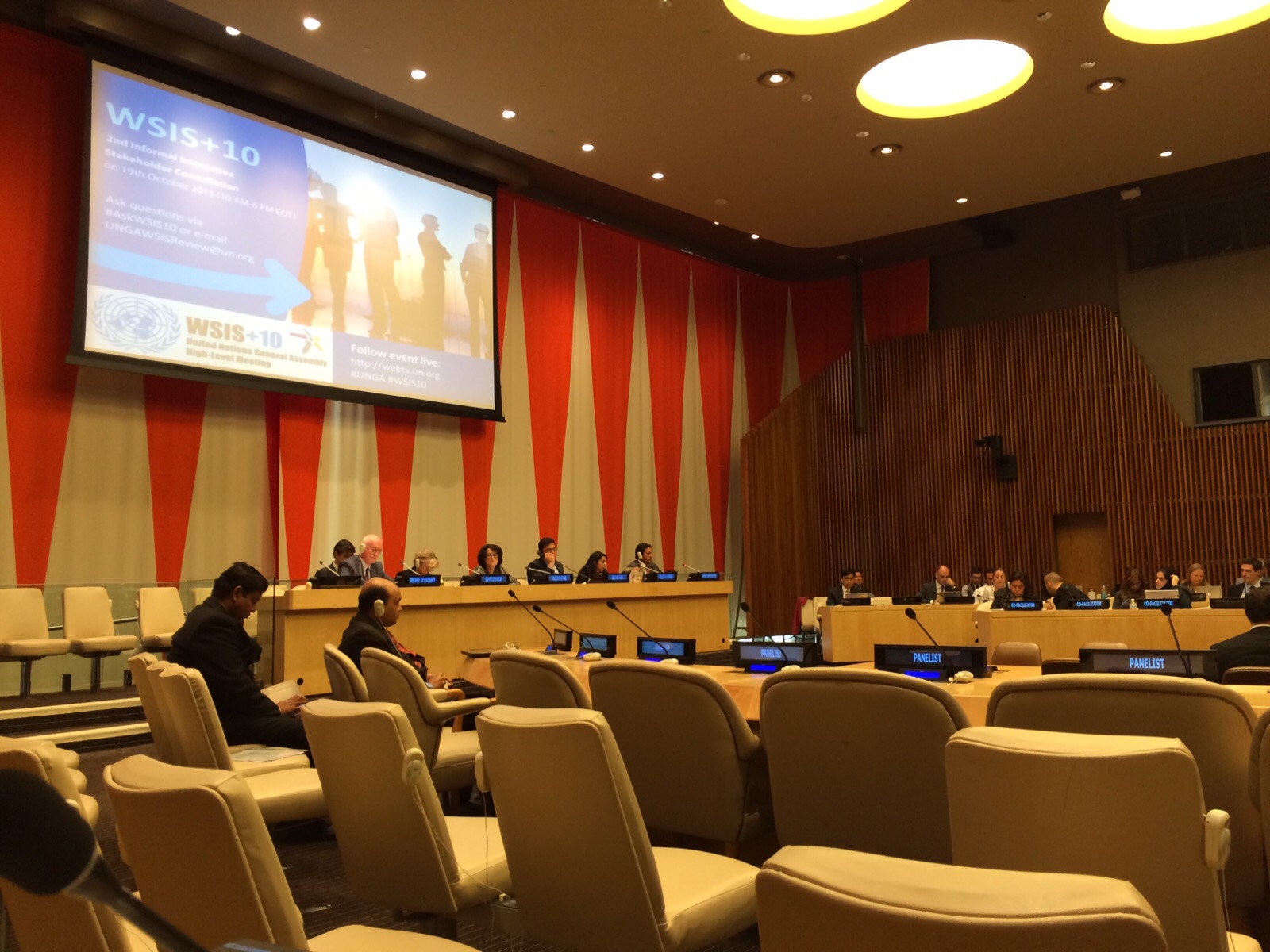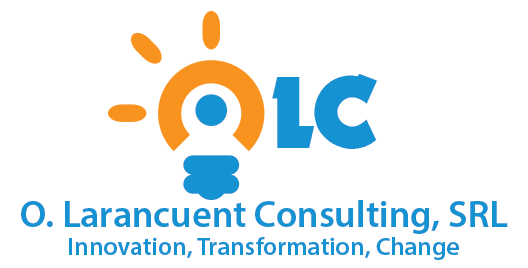October 19th, 2015. New York. Remarks addressed by Osvaldo Larancuent, professor from INTEC, Dominican Republic in the UN WSIS+10 Review Process; as parte of the UN Informal Consultation Process.
First of all, I would like to take the chance thank the United Nations the honor for giving me this opportunity, as a professor from academic sector in Dominican Republic, as well as a professional, a citizen, a father; a member of the Caribbean region willing to contribute with society; to participate in this review process of the outcomes from the last ten years of the World Summit of Information Society (WSIS+10) celebrated in Tunis in 2005; to promote the adoption of Information and Communications Technology (ICT), human centered; to support the achievement of the Sustainable Development Goals (SDG) by all member states.

I salute all members of the UN, all represented governments, civil society communities, private sector, colleagues and all stakeholders present here as part of chorus of voices; interested in make the best out of this process to reduce the digital divide; to promote access, use, creation and sharing of information and knowledge to everyone.
ICT as a medium to improve our communities.
ICT is an enabling platform for Innovation and the creation of Value. This Value can address the SDGs, improving our lives, allowing people to produce ways out from extreme poverty, in a creative way.
Innovation based on ICT, have addressed the creation of Value for business purposes, as well as to improve Social Conditions of Humanity.
Now more than ever we see the vibrant dynamics of change, the creation of Value based on innovation to improve Trade; the services of governments to extend Education, Inclusion, and Participation of all stakeholders,
I think the International communities have achieved great Success and have demonstrated the importance of ICT, as a human centered tool, to contribute the Development of Nations throughout the World.
In no other time in the past, people have had the opportunities to express themselves, to access information via Internet, to improve knowledge and capabilities, share free educational programs, and being proactive users; joining the trends of a new wave of electronic services such as e-government, e-commerce, e-collaboration promoting innovation, bancarization, and change in our societies.
We are seeing improvements in mobile devices functionalities, enabling people to access wirelessly to Internet; allowing people to communicate, interact; use available contents, even produce it; or work remotely. Improvements are amazing! I think the goals to have everyone connected are right, and we see it coming very shortly.
Do we fear to change?
Yes, we all know that people fear change, because of the uncertainty it creates. But we all are willing to accept change if it improves our quality of life, provides us new knowledge, new productive tools, new experiences. ICTs have the potential to promote growth and efficiencies, but they are tools, that needs knowledge, this is not a plug and play process.
We need more access for people to get informed and access contents available on internet. People who access and demand that content, need also local contents in their languages. Civil Society, engineers, technicians, business sectors needs more participation to collaborate in this process. We have seen social innovations and actions from civil society which had succeed in their goals to reduce waste, to redistribute food, to improve health, to create useful contents, with common actions, with impressive results; showing we can change with collaboration; most of them employ volunteers, willing to help.
Also academy, engineers, technicians, and business sectors, want to contribute innovation and to invest on new business models. But for e-government, e-commerce and other emerging tools to succeed, you need citizens and customers to consume your services.
It is important to mention that economic limitations of different countries, prefer to see ICT as a luxury; specially when they face challenges on mitigation of extreme poverty, nutrition, health, education. There is need to improve solidarity, to help them finance those programs, that will improve the quality of life of people, that may use the ICT skills to find new jobs, increase their opportunities.
Being involved in this process of change in our respective countries, and being aware about what has happened in different locations tells us, that willing government can improve our lives. The engagement of all governments, needs to improve and embrace not only the creation of public policies to enable a socioeconomic environment; but also actions to reduce the digital divide, not only for people with economic restrictions, the youth, women and minorities within their countries, and people affected with impaired capabilities. Providing ways for them to feel included and improving their participation.
In which actions have we failed?
More access is needed, for people to connect; but also for nurture them, increasing availability of local digital content, to allow people to access information in their own language; their own cultures; and actions from local government services to reduce the distance and resources gaps to receive them in a faster way. We need more demand, more bancarization, more ICT skills. And also more efforts to create an offer of quality.
I think more efforts are needed from governments and international communities, to reduce the digital divide; improve the quality of lives of their respective people; in their respective nations. We feel they are not taking full advantages of ICT to contribute the achievement of the SDGs.
As we all know the civil society is composed by educated people, as well as not so educated; who know their rights and capacities to engage; they want to contribute to improve changes in their lives, they want to be part of new opportunities; so governments have a great opportunity to continue reducing this collaboration gap.
It is true that public policies require political priorities and financing, but it is needed to work in a step-by-step process: in incremental ways, on a long term implementation strategy, allowing society to benefit from all.
Academies, technicians, engineers and the business sector are the natural sources of knowledge and expertise, and they are also willing contribute innovation and to invest on new business models. But more efforts are required to improve the enabling environment for them to join.
I mean governments come and go, they can only control policy until they leave office. But society stays, is long term oriented, and can assure continuity from achievements.
Which should be the priorities for future implementation?
I would like to see more openness from governments, to design an enabling environment leveraged on collaboration of the different sectors of Society.
This means for instance, on the Internet Governance Forum needs to be extended, as participation of private sector, engineers, technicians, academy and civil society and others groups of interests, have proven to be a constructive way to improve further desired changes required by all of us.
This will improve access and affordability to Internet, more improvement on human rights are needed not only online, but offline also; to be more inclusive, participative, and more creative ways for Financing the development.
The cost from public sector to improve education may be dramatically reduced by using electronic content, using clean energy, taking advantage of contents provided by academy and people in general; also new innovation on wireless technologies will improve reach to rural and remote populations. Also, as less printed resources are needed, we contribute reducing waste and the resources to transport it. Actions must focus on students, and also on the teaching skills to teachers: creating a learning to learn culture.
Politicians and governments are the natural leaders to need to embrace this vision, to leverage their plans using ICT to improve their opportunities to face the challenges. To embrace a long term strategic plan, to create a virtuous cycle, with the collaboration of academia, civil society, business sectors.
To finance this goal, we need more commitment and collaboration from governments to improve the business environments, to improve the infrastructures, enabling environment, to assure change is oriented to the creation of wealth.
To grab this opportunities, governments and politicians need to create trust and embrace a vision of actions, commitment and collaboration. I think it is important to assure that civil society, academy, technicians, engineers, business sectors are willing to engage in a virtual cycle on the short, medium and long term.
I think that once implemented, we need performance indicators, to monitor the outcomes of the process, aligned to plan of action. But we do not always trust this indicators, as we do not see on the surroundings, on our habitat.
How should all these be reflected in the outcome document?
I welcome the spirit of the WSIS+10 Zero Draft, as a tool to inspire the change of the state of minds from the different nations of the world.
But we need to embrace the vision that we are all part of the equation, not only governments. We all agree, that more than information, the flow of knowledge most be available for people to access it, learn from it, produce it and share it.
The concept of governance has improved the achievements of ICT adoption. ICT can improve change, and attracting more collaboration from academy, engineers, civil society, business sectors can contribute, but they need to be included in ways that make sense for all.
The wording of the document, must insist in the importance of collaboration, creation of content, sharing of best practices to implement actions and to obtain results. Knowledge is a key ingredient.
Success of ICT for Development
ICT is an enabling platform for Innovation and the Creation of value. This Value can address the SDGs, improving our lives, allowing people to access, learn, produce and distribute knowledge; in ways to improve growth, employment, literacy, health, education.
Thank you all!

